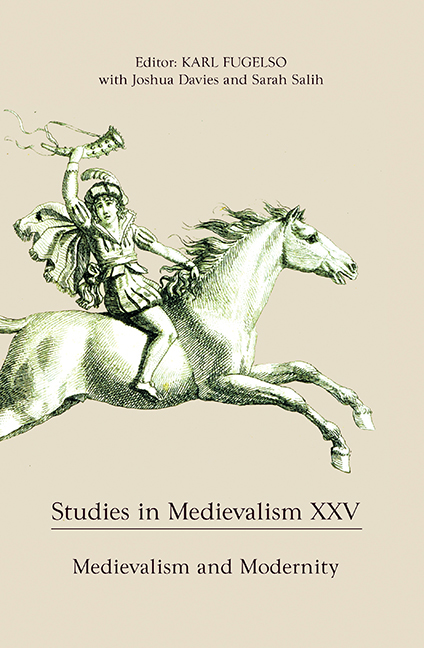Book contents
- Frontmatter
- Studies in Medievalism
- Acknowledgments
- Contents
- List of Illustrations
- Volume XXV 2016
- Editorial Note Karl Fugelso
- I Medievalism and Modernity: Some Perspective(s)
- Medievalism at the End of History: Pessimism and Renewal in Just Visiting
- Medieval Restoration and Modern Creativity
- Crusader Medievalism and Modernity in Britain: The Most Noble Order of Crusaders and the Rupture of the First World War, 1921–49
- From the Republica Christiana to the “Great Revolution”: Middle Ages and Modernity in António Sardinha's Writings (1914–25)
- Moving through Time and Space in Mercedes Rubio's Las siete muchachas del Liceo (1957) via Wagner's Parsifal in Barcelona, Spain (1914)
- II Medievalist Visions
- Contributors
- Miscellaneous Endmatter
Crusader Medievalism and Modernity in Britain: The Most Noble Order of Crusaders and the Rupture of the First World War, 1921–49
from I - Medievalism and Modernity: Some Perspective(s)
Published online by Cambridge University Press: 05 July 2016
- Frontmatter
- Studies in Medievalism
- Acknowledgments
- Contents
- List of Illustrations
- Volume XXV 2016
- Editorial Note Karl Fugelso
- I Medievalism and Modernity: Some Perspective(s)
- Medievalism at the End of History: Pessimism and Renewal in Just Visiting
- Medieval Restoration and Modern Creativity
- Crusader Medievalism and Modernity in Britain: The Most Noble Order of Crusaders and the Rupture of the First World War, 1921–49
- From the Republica Christiana to the “Great Revolution”: Middle Ages and Modernity in António Sardinha's Writings (1914–25)
- Moving through Time and Space in Mercedes Rubio's Las siete muchachas del Liceo (1957) via Wagner's Parsifal in Barcelona, Spain (1914)
- II Medievalist Visions
- Contributors
- Miscellaneous Endmatter
Summary
The Malleability of Modernity
Modernity, one dictionary suggests, is “the mythical moment when ‘now’ began.” An inherently “epochal concept,” modernity carries within it temporal disjuncture: “The idea of modernity rests on rupture.” Both modernity and medievalism carry inherently a sense of chronological distance and difference – now and then. While opinions have varied as to what defined the premodern, the modern, and the nature and duration of the processes of historical change, modernity has served as an umbrella term for now in a comparable manner to the way in which medieval has served as a label for then. The onset of modernity has proved a durable narrative that has framed an assortment of historical work, whether examining processes of change or providing start or endpoints. This study will examine the Most Noble Order of Crusaders (founded in 1921), in order to evaluate the interaction of a reputed moment of modernity with one particular postmedieval response to the Middle Ages.
Modernity, Memory, and the Great War
The First World War has been regarded as just such a moment of modernity: a rupture with the past in which the world emerged irrevocably changed. This view was famously taken by Paul Fussell in his book The Great War and Modern Memory, first published in 1975. Fussell argued that the traditional ways of understanding war and expressing grief were made redundant by the scale of the horror of the Great War: mechanization and national mobilization created a total war, the war to end all wars, which required new methods of representation to convey meaning adequately. Fussell saw these as being essentially ironic and fragmentary, and they heralded a fundamental shift of mentalité in which the war was central: “I am saying that there seems to be one dominating form of modern understanding; that it is essentially ironic; and that it originates largely in the application of mind and memory to the events of the Great War.”
Fussell's argument has been criticized for its dependence on a small cadre of British elite literary sources, an unproblematic understanding of memory, and privileging of individual experience (including his own), yet the narrative of the war as futile, tragic, and presenting an essential break with the past has gained traction. In this vein, Samuel Hynes wrote:
- Type
- Chapter
- Information
- Studies in Medievalism XXVMedievalism and Modernity, pp. 19 - 28Publisher: Boydell & BrewerPrint publication year: 2016

